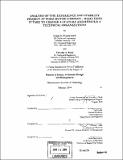Analysis of the experience and stability project at Ford Motor Company : what does it take to change a culture and rebuild a technical organization?
Author(s)
Chatawanich, Candy Suda, 1972-; Rush, Timothy Arthur
DownloadFull printable version (20.14Mb)
Other Contributors
System Design and Management Program.
Advisor
Paul Carlile.
Terms of use
Metadata
Show full item recordAbstract
As Ford Motor Company celebrates its 100th anniversary; it finds itself in a crisis due to its lack of technical proficiency. The lack of technical depth within the workforce is the result of a deeply ingrained culture that encourages employees to change positions every 18-24 months to vastly diverse parts of the company. The problem is exacerbated by years of early retirements, company sell-offs and outsourcing of technical design work to full service suppliers. In reaction to the lack of technical competency, Ford has undergone one of the largest reorganizations in their history. The new organization is now centered on function with loose ties back to the many vehicle programs. In order to encourage a new corporate culture that values technical depth over being a generalist, Ford has also developed additional projects within the organization. One of the most prominent is the Employee Stability Project (ESP) and Technical Maturity Model (TMM) that focus in on developing a technical development plan for each individual engineer. This research analyzes the rollout of the ESP/TMM project within the Body Engineering function (with some comparisons to the Chassis Organization). Data was collected through two surveys conducted nine months apart and focus group sessions. The surveys encompassed the entire Body Engineering organization. In addition, the culture at Ford was compared with the culture developed at one of its main rivals, Toyota. The data for Toyota was collected through one-on-one interviews. The result of the data collected show that entire workforce recognizes that the lack of technical depth within the company is an issue. (cont.) In addition, the concepts and principles behind the ESP/TMM project are understood and deemed important to the company's success. However, there is still resistance to the adoption of the project and momentum behind the support of the ESP/TMM project appears to be stalling. The recommendations by the authors include reinforcing communication, recognition, and demonstration of appropriate technical behaviors at every level within the organization. Ford should also utilize the technical depth within the company (in the form of senior engineers and technical specialists) upfront in the development in new programs and as consultants at key technical milestones to maximize their effectiveness and teaching opportunities. There are also several recommendations around the Individual Technical Development Plan in order to encourage its adoption and ensure its usefulness to the technical development of the engineers. Finally, a vision of a fully functioning, highly technical organization is described to show how this organization can quickly adapt to future challenges that the company may face.
Description
Thesis (S.M.)--Massachusetts Institute of Technology, System Design & Management Program, 2004. "February 2004." Includes bibliographical references (p. 87-88).
Date issued
2004Department
System Design and Management Program.Publisher
Massachusetts Institute of Technology
Keywords
System Design and Management Program.